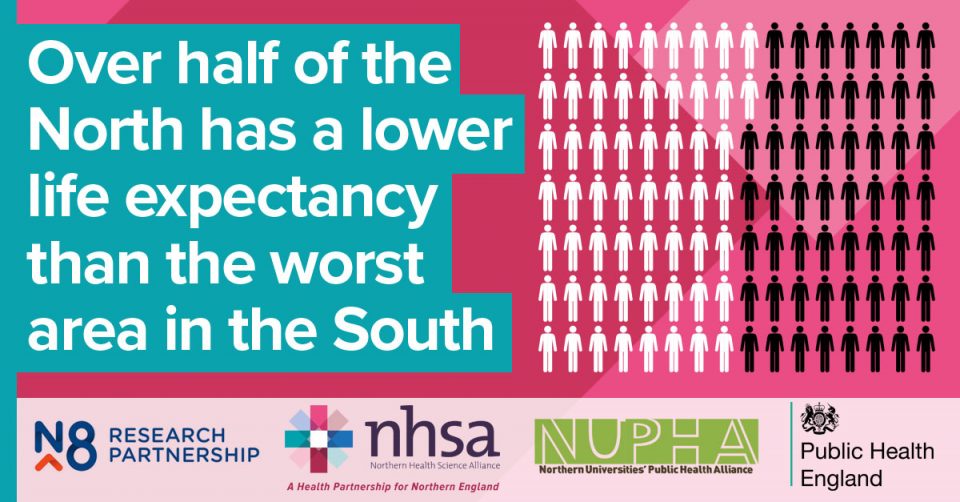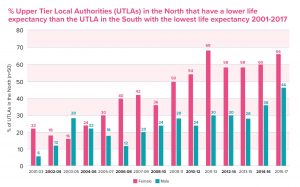
New alliance formed to tackle Health Inequalities in the North of England
LEADING health experts across the North have today joined together as a response to worsening health inequalities between the North and the rest of England showing over half of the North has a lower life expectancy than the worst area in the South.
18th July 2019
Experts announce pioneering group to tackle North/South health inequalities
LEADING health experts across the North have today joined together as a response to worsening health inequalities between the North and the rest of England showing over half of the North has a lower life expectancy than the worst area in the South.
The scale of the issue has led stakeholders involved in the Due North report, the Health for Wealth report and Well North to link together with leading experts from over 20 Northern universities, Public Health England, The Northern Health Science Alliance (NHSA) and N8 Research Partnership to form the Northern Universities’ Public Health Alliance (NUPHA).
The new analysis of figures, to coincide with the launch of the Northern Universities’ Public Health Alliance (NUPHA) at the International Festival of Public Health, shows in 66% of areas in the North, female life expectancy is lower than the area with the lowest female life expectancy in the South. The figure is 46% of areas for male life expectancy.
The figures also show that 88% of Northern Local Authorities have a lower female life expectancy than the England average and 86% have a lower male life expectancy.
Professor David Burn, Chair of the NHSA and Pro-Vice-Chancellor for the Faculty of Medical Sciences at Newcastle University, said: “We know that health inequalities across the North of England are entrenched and worsening. We also know that a third of the productivity gap between the North and the rest of the UK is due to ill health – losing £13.2bn from the UK economy each year.
“Tackling the North’s ill health is vital to growing a vibrant UK economy – an investment in the health of the North is an investment in the entire country, equipping it to move forward into a truly vibrant 21st century economy.
“This world-leading research network gives us the opportunity for a genuinely place-based approach to tackling health inequalities.”
NUPHA aims to build on the messages of the Due North Report, the early work of the Equal North Network, and latterly the NHSA’s Health for Wealth Report. This initiative hopes to work collaboratively across the North, highlighting the gross inequalities seen within the North itself and between the North and the rest of England.
Professor Arpana Verma, a founding member of NUPHA and Clinical Professor of Public Health and Epidemiology at The University of Manchester, said: “NUPHA gives us a great opportunity to collaborate on public health research, particularly on new opportunities on how we work with deprived communities, city regions on devolution, and with our colleagues in local government and the NHS.”
Professor John Newton, Director of Health Improvement Public Health England, said, “Public Health England welcomes this initiative to network public health expertise across the North and to promote more equitable research funding between the North and South of the country. The NHS Long Term Plan places tackling health inequalities and prevention at its heart so this is a crucial time for Research & Development to help us take advantage of all the available opportunities to do so. This is an important new alliance which builds on the considerable expertise across the North of England’s universities and local practitioners.”
Professor Paul Johnstone, Regional Director for Public Health England (North), said: “For so long now the North lags behind the rest of the country economically and in health. Due North set out the evidence to underpin action on health inequalities and we have been using this in the last 5 years since its publication. New approaches to addressing inequalities are emerging all the time and the NUPHA will be key to supporting practitioners and decision makers with the best evidence.”
The full NUPHA statement signed by academics from the NHSA, N8 Research Partnership and Public Health England reads:
“Health inequalities are an enduring challenge across the North of England with evidence that the health gap between the poorest and the richest has been increasing over recent years. There is a substantial health gap between the North and the rest of England, with average life expectancy 2 years lower in the North. When looking at County and Unitary Authorities, also known as Upper Tier Local Authorities (UTLA), 36 out of 50 (72%) of UTLAs for men and 40 out of 50 (80%) for women show a wider gap in life expectancy between the most and least deprived areas than the England average, in comparison to just 11/77 (14%) for men and 6/77 (8%) for women of UTLAs in the South. According to the latest Public Health England data, 33/50 (66%) of UTLAs in the North have a lower female life expectancy than the area with the lowest female life expectancy in the South of England. The corresponding figure is 23/50 (46%) for male life expectancy. Furthermore, 88% of UTLAs in the North have a lower female life expectancy than the England average (86% for males).
“This disparity is further compounded by the inequalities in the health service and research funding that is received by the North compared with the rest of England. Increasing the NHS budget by 10% in the North would decrease economic inactivity rates by 3 percentage points. Health is important for productivity and improving health could reduce the £4 gap in productivity between the North and the rest of England by 30% or £1.20 per-person per-hour, generating an additional £13.2 billion in UK Gross Value Added. In addition to this, according to the latest available figures, the southern regions receive over 4 times as much funding for research and development from the government and research councils. This equates to £21.95 per head in the North and £51.02 per head in the South.”

Data showing the worsening health between North and South
*Calculated using PHE Fingertips data for male and female life expectancy and inequality in life expectancy at birth for the 50 regions that cover NW, NE and Yorkshire & Humber, against the 77 regions for SE, SW and East of England
Reference
Bambra, Munford, Brown et al (2018) Health for Wealth: Building a Healthier Northern Powerhouse for UK Productivity, Northern Health Science Alliance, Newcastle.
Data sources
Public Health England Public Health Outcomes Framework
Office for National Statistics, Gross domestic expenditure on research and development, UK
MEDIA CONTACT
For more interviews, comment etc. contact Hannah.Davies@theNHSA.co.uk, 07342882383.
EDITORS NOTES
NUPHA is an alliance of northern universities and associated stakeholders public health departments and teams. More details on members can be found at www.nupha.ac.uk
The NHSA ltd is a partnership established by the leading Universities and NHS Hospital Trusts in the North of England to improve the health and wealth of the region by creating an internationally recognised life science and healthcare system. It links ten universities and ten research-intensive NHS Teaching Trusts with four Academic Health Science Networks (AHSNs covering a population of over 15 million).
The NHSA’s members include: Newcastle University, Durham University, University of York, University of Liverpool, University of Manchester, Lancaster University, University of Central Lancashire, University of Sheffield, Sheffield Hallam University, University of Leeds, The Newcastle Upon Tyne Hospitals NHS Trust, South Tees Hospitals NHS Trust, Leeds Teaching Hospitals, Sheffield Teaching Hospitals, Rotherham, Doncaster and South Humber NHS Foundation Trust, Tees, Esk and Wear Valleys Foundation NHS Trust, Manchester University NHS Foundation Trust, The Royal Liverpool and Broadgreen University Hospitals, Hull and East Yorkshire Hospitals, Lancashire Teaching Hospitals, Tees, Esk and Wear Valleys Foundation NHS Trust, Innovation Agency AHSN, Yorkshire and Humber AHSN, North East North Cumbria AHSN, Greater Manchester AHSN.
For more information on the NHSA visit www.theNHSA.co.uk
Fuse, the Centre for Translational Research in Public Health, brings together the five North East Universities of Durham, Newcastle, Northumbria, Sunderland and Teesside in an innovative collaboration to transform health and wellbeing and reduce health inequalities through the conduct of world-class public health research and its translation into policy and practice. www.fuse.ac.uk
The N8 Research Partnership is the collaboration body for the universities of Durham, Lancaster, Leeds, Liverpool, Manchester, Newcastle, Sheffield, and York, and aims to maximise the impact of this research base to enable business innovation and societal transformation.
The N8 universities undertake more than £650m of research income each year and employ more than 18,000 academic staff, forming the largest research-pooling partnership in the UK. N8 creates programmes involving a critical mass of world class academics which form networks of innovation excellence with partners in other sectors – to drive investment and economic growth.
Due North is a report commissioned by PHE and can be accessed from https://www.gov.uk/government/publications/due-north-report-phe-response
Health for Wealth is a report commissioned by the NHSA and can be accessed from http://www.thenhsa.co.uk/app/uploads/2018/11/NHSA-REPORT-FINAL.pdf
Well North is a programme funded by PHE and the 10 Pathfinders and further details can be requested from arpana.verma@manchester.ac.uk
Related News Articles
Statement from Chief Executive Officer following the Autumn Budget 2025
The NHSA's CEO has written a response following the Chancellor's Budget announcement
Read the articleNHSA Chair pitches preventative health proposal to Mayor and Minister
The Northern Health Science Alliance recently announced a proposal for a new virtual institute to tackle preventable ill health across the North of England, which aims to improve health and boost the UK economy.
Read the articleNorth Innovation Women 2025
Help us celebrate #NorthInnovationWomen
Read the article